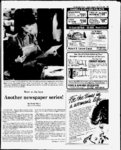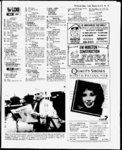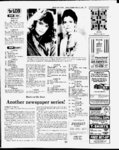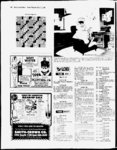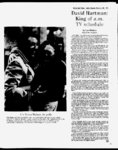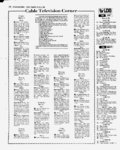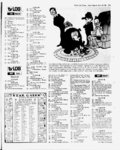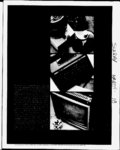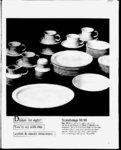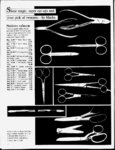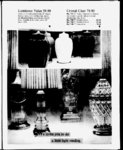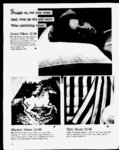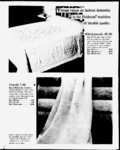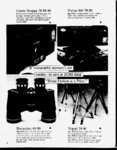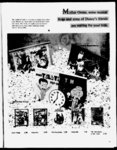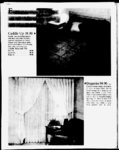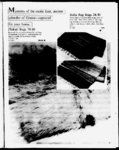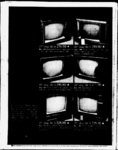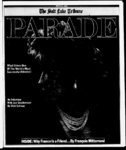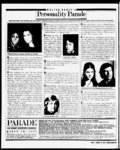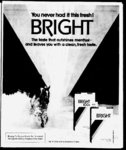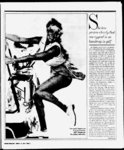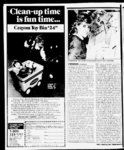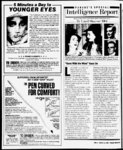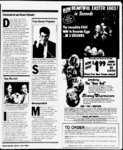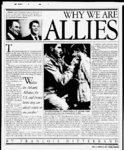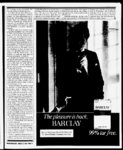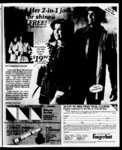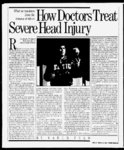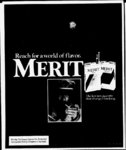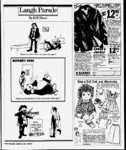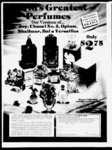| OCR Text |
Show abr Salt akc tribune Sunday Morning Section March 18, 1984 7 'ribunc Page 18 A Explain Jobs Payoff Charges Or Drop Meese Nomination financing they were not all that unusual. What is unusual is the regularity with which people who lent or approved loans to Meese or his wife for their various real estate, tax and in- People who have bought and sold houses during the creative financing" heyday of the recent past won't have much trouble relating to White House counselor Edwin Meese III and the troubles he is encountering in hearings before the Senate Judiciary Committee. Meese is President Reagan's choice to succeed William French Smith as attorney general. Committee hearings have turned up several loans to Meese or his wife, the largest of them connected in some way to financial difficulties brought on by the sale and purchase of houses by the Meese family. Like many another upward-boun- vestment ventures, later obtained government jobs. Some of these willing lenders were political associates from the days when Roanld Reagan was governor of California and as such could be considered logical candidates for appointment anyway. But it is impossible to ignore the cause and effect" relationship between lending to the Meese family and getting a desirable federal position. We have no difficulty understanding the financial pressures that bore down on the Meeses as they tried to settle in along the Potomac. During that time they were visited by personal tragedy when a son was killed in an automobile wreck. Under the circumstances, accepting tempting loans to tide things over until the California house was sold doesn't rank as a major ethical lapse. We are not yet convinced, however, that the subsequent job appointments were pure chance as Meese says. The appearance of payoff, if not the substance, is strong indeed. Unless this suspicion can be explained away at forthcoming appearances before the Judiciary Committee. Reagan should withdraw the d American who moves to another part of the country to take a better job, Meese found himself paying for a house in California and another one in the Washington area. For 20 months he was making mortgage payments that totaled more than $50,000 a year on a government salary of $60,000. The new presidential adviser was fast going broke and he accepted loans on attractive terms and other favors from friends and former associates. One of the loans, for $15,000 to take advantage of an attractive stock offering, was only acknowledged this past week after a reporter inquired about it. Details of some of these transactions might seem questionable but in the wheeler-deale- r world of creative open expression of competing and contradictory thoughts which is so crucial to the success of representaIn applying tive that concept to the press. Madison wrote: "Some degree of abuse is inseparable from the proper use of everything, and in no instance is this more true than in that of the press." But with further explanation, he observed; To the press alone, checkered as it is with abuses, the world is indebted for all the triumphs which have been gained by reason and humanity over error and oppression." Yet, it was not only for journalists that Madison helped author a Bill of Rights, nor can the press make any exclusive claim on its First Amendment. Rather, from this monumental section of the U.S. Constitution all Americans, of every endeavor, gain It may not be prominent, nor frequently used, nor as yet a relapsing that justifies great alarm. But the once method of discreditideas or views by suggesting a ing is motive sinister increasingly discernible. , At times of national stress or danger the open and candid expression of opinion can be risky. The need to defend against genuine peril, alien or domestic, will allow, if not fully excuse, impositions on dissent. At all other times, in, especially, a free and open society such as the United States, it is reprehensible. Bouts of fearmongering for political gain have occasionally afflicted this country. Fortunately, recovery has been possible and provident. Not. however, without timely diagnosis and determined convalescence. To chill the fever before it rises again, it is fitting that Americans evtoo-hand- y erywhere periodically remind themselves of the free speech privileges and responsibilities bequeathed them by their nation's founders. Which is why the weekend started with observances Friday of James Madison's birthday. Acknowledged as guiding genius of the U.S. Constitution's Bill of Rights. Madison foresaw accurately the importance of gaurunteeing that Still their opportunity and obligation to speak and write as their convictions, conscience and inclinations direct. More important, it should be the barrier which promptly deflects any attempt to silence merely displeasing or disagreeable points of view. Ultimately, allegiance to the First Amendment requires the courage to tolerate error and mistake as well as the insistence on affirming fact and truth. w orking In 1942 wildfires devastated mure than 10 million acres el America's forests and grasslands. By 1981 that acreage had been reduced to 3 million acres; a reduction U.S. Forest Service officials estimate amounts to more than a $20 billion savings. More efficient fire fighting and detection methods have undoubtedly contributed to tho.se savings, but probably the single most effective device was the Smokey Bear result of sonic bureaucratic paperwork. Smokey came to life in a Forest Service memorandum on Aug 9 1944. describing a new poster bear that would carry a Fro prevention message. He was named Smokey after Smokey Joe Martin, who was assistant chief of the New York Citv Fire Department from 1919 to 1930 It wasn't until 1950. however, that the first living symbol ot Smokey was discovered following a forest lire on the Lincoln National Forest near a pitan, N.M. He was a badly burned cub firefighters found clinging to a blackened tree. Eventually, he was moved to the National Zoo in Washington. D.C.. when1 he lived until ( 1976. Another American II o k bear has taken his place, but to keep the tradi- tion intact zoo officials will never reveal if the bear playing "Smokey" is ever changed. It's hard to recall any advertising device that enjoys as much universal adoration and prolonged recognition as does Smokey Bear. Chief of the Forest Service, Max Ieterson. quite aptly describes his agency's best public relations man. "Smokey may be getting older but he is also getting better." he said. "He is still one of the most successful of all advertising symbols in the United States. And he popular is still one of the most and loved animal characters." Computers May Threaten Privacy to detect fraud and other "matching crimes. The goals of most matching projects are noncontroversial tracking down fathers who fail to pay child support, for instance. Unfortunately, a precedent has been set run by multinational corporations such as Lockheed Corp., GTE Corp., and McGraw-Hil- l Inc., tend to concentrate control over information in the hands of a few. The potential for misdirection is great. Can we count upon Lockheed's Dialog to list the writings of antimilitary activists? For customers who depend on digital information sources, the decision to erase a computer entry can be as significant as removing and burning a book from the library shelf. There is an alternative, however. Armed with the right software (essentially, the programmed set of instructions a computer must be given to perform a certain function), the operator of a typical desktop computer system can set up his or her own computerized bulletin board. For phone charges only, a computer user anywhere can dial in. leave or pick up messages for a specific person or all users. Still, it is difficult for unfunded, volunteer bulletin boards to compete with the commercial data bases in publicity, volume or timeliness. While some microcomputer enthusiasts predict that every home will soon have a computer, it is likely that the number of Americans with computers capable of comthrough which government agencies can munication will remain far below the 90 perrummage through computer memories full cent with telephones. Only those with comof information on innocent people, and use municating computers will have access to that information for purposes other than the most information systems. sophisticated those for which it was collected. of computer activa handful are There Present law outlaws aural" (voice) the United States who are workaround ists of the telephone monitoring wiretapping, conversations, without judicial approval, but ing to make computer technology available to everyone. In the San Francisco Bay Area, "nonaural" surveillance is legal. Law enforcement and intelligence agencies can and for instance, a project called Community Memory has designed streetcorner do record telephone dialing information -can plug terminals, so that passers-bwho's calling whom and digital data a free bulletin board system. into between transmissions computmessages ers and other electronic devices. In fact, the But the activists have limited resources. General Accounting Office, an investigative Unless governmental or institutional suparm of Congress, warns that existing legislaport is found, the information revolution will tion may permit listening in on the growing bypass millions of Americans. The governpercentage of voice transmissions that have ment. corporations and even the universities been converted to digital pulses within the are too busy collecting information on all of us to collect, digitize, process and make telephone network. available information for our use. New technologies threaten our protections against unreasonable searches and seiLike the plow, the steam engine and the zures in the Fourth Amendment to the U.S. auto, the computer is already having a proConstitution. Our privacy has been eroded, found impact on the way we live, work and and unless strong protective action is taken play. There is a tendency, in this country, to soon, the information revolution will threatview the information resolution as either enen our freedoms as well. tirely desirable or irresistable. In fact, howTo the fewer than 3 million American ever, the rise of computers and communicahouseholds - those with personal computers tions technology can have both positive and and "modems" to hook them up to the telenegative consequences. As individuals, parphone system - the information revolution ents. employees and voters we can shape that technology. promises unprecedented access to information resources. Computer information serUnfortunately, many people feel that the vices such as CompuServe, Dialog. Nexus way to prepare for the age of information is news, bibliand the Source offer that is. to to become "computer literate" ographies and financial information. Those learn how to use a computer. Computer services are expensive, so only affluent indimanufacturers have promoted this notion, viduals and institutional customers make targeting and even donating their products widespread use of them. to the nation's schools. As use increases, however, prices should There is nothing wrong with computer fall. Meanwhile, new information channels, literacy, but to prepare for and help influsuch as cable, unused television and radio ence our future, we need computer citizensignals and direct satellite hookups could ship" courses, in which the social, political and economic consequences are covered bring data bases to larger numbers of people. Material of this sort can be built into school Large computer information systems. curricula at every level. By benny Siegel Special to Newsday Apple Computer Inc. startled millions of Super Bowl fans with its Big Brother commercial, in which the pioneer personal computer manufacturer announced that its new Macintosh computer would show why 1984 won't be like '1984.' " Though the technical innovations built into the new machine have very little to do with the future of human freedom, the ad poses the right questions. Do recent advances in computer, communications. and microelectronics technology pose a threat to our privacy'. Or will they open up new avenues for democracy and individualism'1 High technology provides us with tools for the collection and dissemination of huge volumes of information. But political and economic decisions, not technology, will determine who has access to d y Lenny Siegel is the direetor of the Paeif-iStudies Center in Mountain l ieu. Calif., a puhlie interest information renter for the "Silicon Valley. lie is working on a hook tentatively tilled Where the Chips Slav" Fall: The Social Impact of High Technology (Harper & Row Bessie). first went to work his job was to remind people that nine out of ten forest fires were So effective was the combination of symbol and slogan that man-cause- Smokey was given a new line: Ovhj ran ircrcui forest fires. non celebrate his 40th birthday, Smokey will adorn a new poster showing him with a birthday cake and, appropriately, the message "Make Smokev's Birthday Wish Now. to Come True." four decades later, Smokey Bear, still wearing his flat brimmed hat and carrying his shovel, remains So. on t tie job. c must prepare ourselves and our children to make those decisions By now most Americans realize that government agencies, financial institutions, employers and other corporations collect vast amounts of personal information in their computerized data banks. Most people, however, do not realize that the capacity and speed of such systems is rising as fast as microelectronics technology will allow. One of the men responsible for TRW Inc.'s credit bureau, which is capable of handling 325.000 credit reports on 90 million households each day. reports "our data base management system has pushed the state of the art almost continuously'' - in other words, the system is kept as technologically advanced as possible. More importantly, modern computers arc being used to compare data in two or more data banks. There arc now over 230 state and federal projects conducting such those tools. Loved Ones of Accused Artist -- Torturers Striking Innocents By Flic Wicsol Special to Newsday Torture, in its ultimate, is worse than death. In prison, facing the to: tin or. the victim dies more than once. Death, for the prisoner. could even appear as a deliverance. This explains the fascination of certain policemen - lanatic defenders o! dictatorial regimes - with torture They make a science of it. A Uli lis rules and its laws, its triumphs and its discoveries. torture brings them the joy s and disappointments that or researchers otherwise know. It should not astonish us that our century, so rich m inventions, has been able to inscribe in its list id honors techniques in this area that are new and often efficacious as only-artist- well Icy baths, nails pulled out. testicles crushed'1 All these are still being used. o course, tail they are nevertheless a little outdated Ihvsical torture is as old as the world; Flic Wiesel. who. unlike his parents, survived Xusehwitz. is the author of man " hooks, iniiudwg "Souls on Fire. "I he and "The Testament" (Summit). Wiesel. who writes in French, lives in Manhattan. This essay was translated hv Xewsdav Assistant Viewpoints Lditor David Kahn. v ho-lem- Sodom had even elevated it into a system, not into a policy of state The Homans, moi e practical, used it only to extinct confessions The inquisitors, too In our time, torture specialists are forced and are to innovate. They want to he psychologists. They want to prove tb.-- ' they have more imagination than tl.eir mi Pins And so it has been discovered that nothing so quickly destroy s pi imiih is as torturing f'etr loved ones, their voting chlldieil it n u la if When Smokey Common Currier Laws Need lo He Updated e First Amendment Task letters luli tor in Is ; , I iy In the last analysis, the true torturers, the triumph only in relation to iheir v ictims To claim Victory, the torturer must humiliate the victim Humiliation constitutes the essential element of torture artisi-torturers- . certain prisons, the inmate is undressed Nudity alone produces a feeling of v ulnerabilitv and o addilion.il ei Mot covet. Hie victim n blindfold Thus, in ed. or else left in silence. Deprived of senses, the victim feels diminished, belittled In the specialized Soviet prisons, torturers go further In drugging the prisoner, they expect to befuddle it not to stifle his or her conscience. Thus the prisoner is reduced to the state of a plaything - and of an object In cases like that, torturers have to recoil They prefer an awakened consciousness. capable of fet ling sorrow and anguish. If the victim is net aware of self, does not feel conquered, the torturer will be deprived of v k tory Torturers canm obtain this victory foiiii their siipcriois. only the victims can give it to them. It is a patadox Hi.it touches the ahsurd The professional tar their victims a peers acknowledge in powi almost equal to their own All the praist - nf t heir chiefs are not worth the victims' fii't gestures or sighs ot submission. It one reads the reports of Amnesty In ternational. it is sadly evident that torture has never been practiced in so many countries. nor in so varied a manner. Hunger, thirst, exhaustion, threats, isolation. noise, standing for nights in a row. the whip, electric shock, burns, rape: we read these accounts with a feeling of shame. All the more situ e. in the last years, they have been taking on children. In Syria. Chile. Iraq. El Salvador, Iran. Argentina, in still other countries, children of all ages have been arrested to intimidate their parents. They torture the ones in the presence of the others. Thus we can affirm it: The technicians of torture continue to perfect their "art." They strike the primary victim through those who are close to him or her. Hence the torturer's victory. The prisoner loses by revealing what the torturer wants. Or he or she maintains silence and is destroyed inside by guilt over w hat has happened to loved ones. This technique seems totally new. "revolutionary." Only in the 70s was this technique erected into a system It is in force in most dictatorial countries. There innocents are tortured because they are innocent; their brothers, their mothers. who are accused of being subversive, are targeted through them. In imagining the demands to which their children or other relatives submit because of them, prisoners in the end doubt their reason. if not their reason for living If the choice is between two forms of betrayal. why continue1 Here is the goal of the torturer lo drive the v ictim to disdain his or her own self. How often the torturer succeeds, I fear to speculate on. I know only that we ought to do everything to stop the torture of children. As long as children are cmelly beaten to make the adults who love them speak, we do not have the right to believe in the humanity of human beings Children tortured, bloodied, mutilated, disfigured, assassinated ought to haunt us. Ami question us In order to render us conscious of our mute complicity And ash, lined |












































































































































